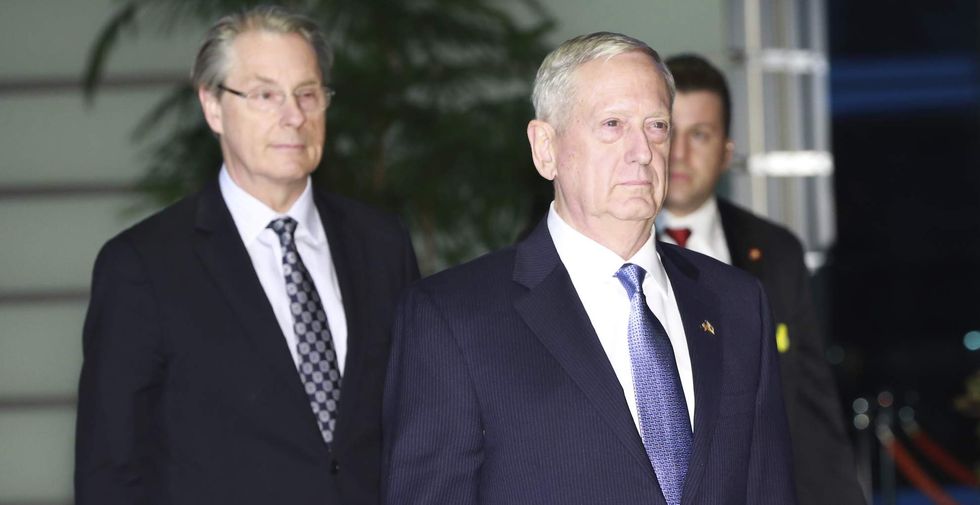
Eugene Hoshiko/AFP/Getty Images

Secretary of Defense James Mattis is taking a hardline stance against North Korea over its saber-rattling, promising an "effective and overwhelming" response should the country ever use nuclear weapons.
"Any attack on the United States — or our allies — will be defeated, and any use of nuclear weapons would be met with a response that would be effective and overwhelming," the retired four-star Marine general said Friday during an appearance with South Korean Defense Minister Han Min-Koo, Reuters reported.
Mattis' comments follow continued concerns that North Korea could be preparing to test a new ballistic missile — a move that could prove to be an early challenge for the Trump White House. In his New Year's address, North Korean dictator Kim Jong-un said his country is in the "final stage" of preparation to test an intercontinental ballistic missile, NPR reported.
An intercontinental ballistic missile is a land-based, nuclear-armed ballistic weapon with a trajectory of more than 3,500 miles.
North Korea, which frequently vows to destroy both South Korea and the U.S., conducted more than 20 missile tests in 2016, as well as five nuclear tests over the last decade, defying United Nations sanctions against them.
Former President Barack Obama received criticism last year from both Republicans and then-Democratic presidential candidate Hillary Clinton for not taking a stronger position against North Korea after it conducted its fifth nuclear test, according to Politico.
Obama's opponents and allies alike distanced themselves from the White House for being too soft on Chinese companies, banks and individuals doing business with North Korea. According to the Council on Foreign Relations, China is North Korea's "most important ally, biggest trading partner, and main source of food, arms, and energy."
Beijing, while it has sought a denuclearized North Korea, has long opposed strong sanctions against Pyongyang, citing concerns that a regime collapse in the North could lead to an intense influx of refugees across their 870-mile border.
Obama "should immediately make full use of the sanctions authorities Congress gave him earlier this year," House Speaker Paul Ryan (R-Wis.) said at the time.
"He should join me in urging China, as Pyongyang’s chief sponsor, to fully enforce the international sanctions on the Kim regime," Ryan added, referring to North Korean dictator Kim Jong-un.
Clinton, for her part, called for a "rethinking" of the U.S.'s strategy against North Korea. She called the nuclear and missile tests "outrageous and unacceptable" and described the country's "determination to develop a deliverable nuclear weapon" as a "direct threat to the United States."
According to Reuters, North Korea has also apparently restarted operation of a reactor at its main Yongbyon nuclear facility, which produces plutonium to be used for the country's nuclear weapons program.
According to new data from South Korea, the Kim regime has stockpiled enough plutonium to develop 10 nuclear warheads, Time reported last month.
"North Korea continues to launch missiles, develop its nuclear weapons program and engage in threatening rhetoric and behavior," Mattis said.
In response to the continued missile and nuclear tests from the Kim regime, the U.S. and South Korea have developed the U.S. missile defense system, Terminal High Altitude Area Defense (THAAD), which is expected to be deployed in South Korea later this year.
THAAD is a land-based, vehicle-mounted system developed by Lockheed Martin with a "globally-transportable, rapidly-deployable capability to intercept and destroy ballistic missiles inside or outside the atmosphere during their final, or terminal, phase of flight," according to the Defense Department's Missile Defense Agency.
While the Chinese Foreign Ministry, through spokesman Lu Kang, said it does "not believe [THAAD] will be conducive" to resolving the North's nuclear proliferation, the South Korean defense minister said Mattis' remarks send a clear message.
"Faced with a current severe security situation, Secretary Mattis' visit to Korea ... also communicates the strongest warning to North Korea," Han said.